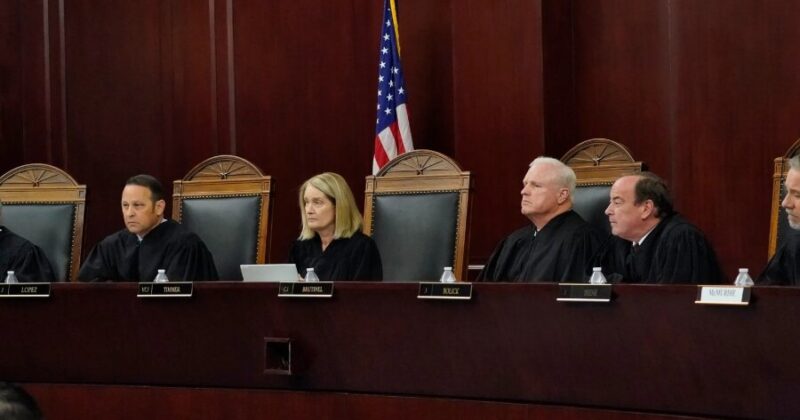The Arizona Supreme Court ruled on August 14 that a proposal criminalizing illegal border crossings and granting local law enforcement the authority to make arrests near the state’s southern border with Mexico will be on the November 5 ballot.
In its ruling, the Arizona Supreme Court dismissed a challenge from Latino groups who claimed that Proposition 314 violates the state constitution’s rule requiring ballot measures to address only a single subject.
The court said it agreed with a previous lower court ruling on the matter that rejected that argument.
In an order by Chief Justice Ann A. Scott Timmer, the state’s highest court concluded the measure satisfies the single-subject rule.
“The Court unanimously agrees with the superior court that Appellants have not met their burden to overcome the strong presumption that HCR 2060 is constitutional,” the court wrote.
The Arizona House of Representatives passed Proposition 314, also known as HCR 2060, in June.
If approved by voters, Proposition 314 would make it a state crime to cross the Arizona-Mexico border outside of official ports of entry and would give Arizona state and local police the authority to arrest individuals who cross the border illegally.
The proposition would also allow state judges to order the deportation of those who violate the proposed law, returning them back to their countries of origin.
The proposition would also make it a felony, with a penalty of up to 10 years in prison, for knowingly selling fentanyl that results in someone’s death.
Additionally, it would require certain government agencies to use a federal database to verify a noncitizen’s eligibility for benefits.
In their lawsuit opposing the proposition, groups like Living United for Change in Arizona argued that it unconstitutionally covers multiple issues, including immigration enforcement, the fentanyl crisis, and the regulation of public benefits, rather than sticking to a single subject.
Allowing the measure to be on the ballot would effectively lead to the state’s single-subject requirement being meaningless, they argued.
However, the Arizona Supreme Court in its order said it is “not necessary that the components have a free-standing relationship to each other.”
“HCR 2060’s subject is ‘responses to harms relating to an unsecured border,’ and all components of the proposed law are ‘reasonably related’ to that subject,” the court wrote.
“Having rejected Appellants’ arguments, HCR 2060 will appear on the ballot,” it concluded.
There were 83,536 illegal immigration encounters between ports of entry along the southwest border in June, according to data released by the U.S. Customs and Border Protection (CBP).
According to the agency, that marks the lowest monthly total for the Border Patrol along the southwest border since January 2021.
Share your thoughts by scrolling down to leave a comment.

